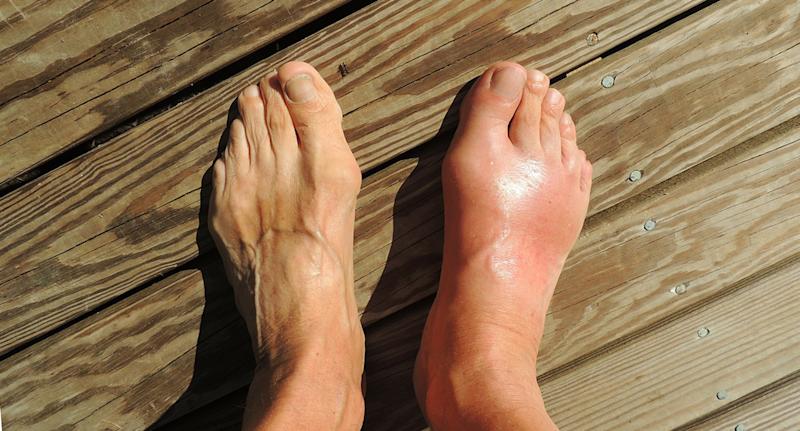How To Avoid Gout Attacks
There are several lifestyle changes you can make that will make gout attacks less likely:
- Be sure to exercise and eat a balanced diet to control your weight.
- Follow a diet geared towards the prevention of gout
- Stay hydrated water can flush out excess amounts of uric acid.
- Avoid sugary drinks and alcohol.
- Eat less red meat. Try to get your protein from low-fat sources, such as greek yogurt and other dairy products, like milk and cheese.
You can also try supplementing your way to better health. Dr. Meredith Warner, the founder of Warner Orthopedics & Wellness, believes that sustainable lifestyle changes have real power to drastically improve your overall well-being.
Its why she also founded The Healing Sole, an orthopedic flip flop designed to naturally relieve plantar fasciitis pain and other heel pain with every step you take.
One of the products she offers on The Healing Sole website is her new Tart Cherry Extract supplement. Tart cherries have long been used as a natural way to prevent gout flare-ups and this new extract gives you a standard amount of extracted tart cherry juice, without added sugars.
How To Prevent Bunions
Take these steps to help ward off bunions, or at least slow down the progression of bunions:
- Choose shoes with a wide enough toe box, so your toes aren’t crammed close together.
- Try on shoes in the afternoon, when your feet have experienced their fullest swelling of the day, so you don’t buy them too small.
- If you have flat feet, buy shoes specifically for flat feet. For shoes you can’t part with, get custom orthotics from your podiatrist.
- If you see signs or symptoms of a bunion, don’t delay treatment. See your doctor for evaluation and a treatment plan.
Who Can Take Allopurinol
Allopurinol is often recommended as the first choice of treatment to control gout. If your doctor prescribes it as soon as you are diagnosed, it may prevent future attacks and joint damage.
You will usually be offered allopurinol if blood tests show that your urate level is high enough for urate crystals to form, especially if one or more of the following applies:
- you are having frequent attacks of gout.
- your joints have been damaged by gout.
- your skin has visible deposits of urate crystals. These are firm white lumps, which are called tophi.
You may not be offered allopurinol, or you may be given a lower dose, if you:
- have ever had an allergic reaction to allopurinol.
- are currently having an attack of gout.
- have problems with your liver or kidneys.
- are of Han Chinese, Thai or Korean origin.
- have thyroid problems.
Recommended Reading: Does Acupuncture Help With Gout
Can Gout Be Prevented Or Avoided
There are several ways you can help lower your risk of gout and prevent future attacks.
- Limit or avoid foods that are rich in purines. These include salmon, sardines, herring, organ meats, asparagus, and mushrooms.
- Try to eat foods that are low in salt and fat.
- Lose weight if youre overweight.
- Limit the amount of alcohol you drink.
- Drink lots of water to help flush uric acid from your body.
Certain health conditions can increase your chance of gout. Get treatment if you have high cholesterol, high blood pressure, or diabetes. Medicines that may cause gout include:
- Diuretics used to treat high blood pressure
- Niacin
What Is Gout How To Know If You Have It And Recommended Treatment

- Gout is the most common type of inflammatory arthritis and causes pain in the joints, particularly the big toe.
- It is caused by a buildup of uric acid, which is produced when your body digests purine, a chemical that is concentrated in foods like shellfish, red meat, and alcohol.
- To treat gout, you may need to take anti-inflammatory medications, avoid foods with purines, and lose weight.
- This article was reviewed by Melissa Rifkin, MS, RD, CDN, owner of Melissa Rifkin Nutrition LLC.
- Visit Insider’s homepage for more stories.
Gout is an intensely painful form of arthritis that affects over 8 million Americans. As our diets change to include more processed foods, and with the increase in popularity of high protein diets, gout is on the rise, especially for older men. Here’s what you need to know about the causes, symptoms, and treatment for gout.
Don’t Miss: How To Stop A Gout Attack
When To See A Healthcare Provider
Not everyone with gout will experience worsening symptoms or need urate-lowering therapy. With that being said, if you ignore symptoms or fail to take action to avoid attacks, you may end up causing yourself long-term harm.
People with gout will sometimes think that the prolonged absence of symptoms means that the disease has spontaneously disappeared. This is usually a fallacy. Unless the underlying cause of high uric acid levels is controlled, the disease can advance silently and reap irreversible harm.
For some guidance on talking with a medical professional about your gout, use our Healthcare Provider Discussion Guide below. It can help you start a conversation with your healthcare provider about symptoms, treatment options, and more.
Gout Healthcare Provider Discussion Guide
Get our printable guide for your next healthcare provider’s appointment to help you ask the right questions.
The following are reasons why you should definitely see a healthcare provider about your gout:
- This is your first attack. Even if treatment is not prescribed, you might benefit from lifestyle modifications to reduce the risk of future attacks.
- Your symptoms don’t improve after 48 hours or last for more than a week. If you are on therapy, this may be an indication that changes need to be made, including dietary and lifestyle interventions.
- You have a high fever. While a mild fever can accompany a gout attack, a high fever may be a sign of an infection.
What Should I Think About When Deciding About Gout Treatment
You and your health care professional can decide what might be best to treat your gout attacks and help prevent future gout attacks. Here are some things to think about. Be sure to share your thoughts with your health care professional.
- How often do you have a gout attack?
- How do you feel about taking medicine to treat a gout attack?
- How do you feel about taking a medicine every day to help prevent future gout attacks?
- Which possible side effects concern you?
- How do you feel about trying other things, such as exercise, drinking plenty of water, and changing your diet to help prevent future gout attacks?
Ask Your Health Care Professional
- What problems can gout cause if not treated?
- Which medicine might be best to reduce pain and swelling when I have a gout attack?
- How can I help prevent future gout attacks?
- Might a medicine to lower the amount of uric acid in my blood help? If so, which one might be best?
- How long would I have to take the medicine?
- What side effects of the medicine should I watch for?
- Should I make any changes to my diet and alcohol use? If so, what specific changes should I make?
- Are there other things I can do that may help?
Don’t Miss: How Do You Treat Gout In Your Big Toe
Medications For Acute Gout
Whats The Outlook For People With Gout
Untreated gout can lead to permanent joint damage. The buildup of uric acid in the joints and soft tissue is called tophus. Some people with gout can also develop other health problems, such as severe arthritis, kidney stones and heart disease. Its important to discuss your symptoms with a healthcare provider.
Read Also: Is Grapes Bad For Gout
How Doctors Diagnose Gout
and swelling are common signs of . However, they also can be symptoms of other health problems and other types of . That makes it important to see a doctor if you think you might have gout.
Your doctor will ask about your symptoms and also do some tests. That’s how your doctor can make sure that what you have is truly gout.
Who Is Affected By Gout
Gout can affect anyone. It usually occurs earlier in men than women. It generally occurs after menopause in women. Men can be three times more likely than women to get it because they have higher levels of uric acid most of their lives. Women reach these uric acid levels after menopause.
People are more likely to get gout if they have:
- Obesity, or a lot of extra weight.
You are also more likely to develop gout if you:
- Consume a diet high in animal proteins
- Consume a significant amount of alcohol
- Are on water pills .
Read Also: How Does Allopurinol Treat Gout
What To Do During An Attack
You should:
- take any medication you’ve been prescribed as early as possible after you notice an attack this should start to have an effect within two or three days
- rest and raise the limb
- avoid knocking or damaging the affected joint
- keep the joint cool remove surrounding clothing and apply an ice pack, such as a bag of frozen peas wrapped in a towel
- ensure you’re well hydrated
Apply the ice pack to your joint for around 20 minutes. Don’t apply ice directly to your skin and don’t apply it for more than 20 minutes at a time because this could damage the skin.
If necessary, you can keep reapplying an ice pack to your skin during an attack, but you should wait until your skin has returned to a normal temperature first.
What Causes Gout In The Knee

Gout develops when the body has high levels of uric acid, a normal waste product. This is known as hyperuricemia.
Uric acid is normally excreted through the body via the kidneys, but in some people, levels can remain high and uric acid can start to accumulate and crystallize in various joints. When these uric acid crystals affect the joint in the knee, it can cause gout symptoms in the knee, making the knee joint red, swollen, and hot to the touch. The buildup of uric acid can also impair the knee joints full range of motion, which can make it difficult to walk.
A number of factors can influence your risk for gout.
Read Also: Sour Cherry Juice For Gout
What Have Researchers Found About Medicines To Help Prevent Future Gout Attacks
Researchers found that:
- Allopurinol and febuxostat both lower the level of uric acid in your blood. One does not work better than the other.
- Allopurinol and febuxostat do not lower the risk of a gout attack in the first 6 months of taking either medicine.
- But, they do lower the risk of a gout attack after taking either medicine for 1 year.
Who Should Diagnose And Treat Gout
The disease should be diagnosed and treated by a doctor or a team of doctors who specialize in care of gout patients. This is important because the signs and symptoms of gout are not specific and can look like signs and symptoms of other inflammatory diseases. Doctors who specialize in gout and other forms of arthritis are called rheumatologists. To find a provider near you, visit the database of rheumatologistsexternal icon on the American College of Rheumatology website. Once a rheumatologist has diagnosed and effectively treated your gout, a primary care provider can usually track your condition and help you manage your gout.
Recommended Reading: Home Remedies For Gout In Finger
How Will Gout Affect Me
Attacks can vary from person to person. Some people only have an attack every few years, while others have attacks every few months.
Without medication attacks tend to happen more often and other joints can become affected.
Having high urate levels and gout for a long time can lead to other health problems, including:
- narrowing of the arteries – which can lead to an increased risk of stroke or heart attacks or other heart problems
- osteoarthritis, which occurs when the urate crystals and hard tophi cause joint damage.
- an increased risk of developing kidney disease or worsening of the condition if you already have it
- kidney stones
- an increased risk of some cancers, especially prostate cancer
- mental health problems, including depression
- underactive thyroid
- erectile dysfunction in men.
If you take medication to lower your urate levels, and have a healthy diet and lifestyle, most of the damage and complications caused by gout can be stopped.
Treatments for gout are incredibly successful. There are two main parts to treating gout, which are:
- treating the acute attack
- treatments to prevent future attacks.
Is This Information Right For Me
This information is right for you if:
- Your health care professional* has said that you have gout.
- You are age 18 or older. This information is from research on adults.
* Your health care professional may include your primary care doctor, nurse practitioner, physician assistant, rheumatologist , orthopedist , or emergency room doctor.
This summary will answer these questions:
- What is gout?
- How is a gout attack treated?
- What have researchers found about medicines to treat a gout attack?
You May Like: What Is The Cause Of Gout In The Ankle
What Does The Future Hold For Gout
Active research is ongoing in a variety of fields related to gout and hyperuricemia. Scientists have found that high animal protein slightly increased the risk for gout. New drugs are being developed that may be more versatile and safe in treating the elevated uric acid levels in patients with chronic gout.
Gout Is A Condition That Most People Dont Hear Much About Until They Personally End Up With It
This painful leg and foot disorder can cause sufferers to experience terrible symptoms that leave them unable to do much until the flare is completely under control. There are many different causes of gout and it is somewhat difficult to treat, which is why we wanted to educate you on what gout might mean for you. In this article, we will discuss gout as a disease, as well as its symptoms and treatments.
Recommended Reading: Can Gout Be Cured Forever
What Are Gout Attacks Like
Gout attacks cause sudden, sharply painful sensations in the affected joints. Unfortunately, during a gout attack, your pain will be severe. You may also experience swelling, redness, and limited motion in the affected joint.
These attacks can occur very suddenly. People have been known to awaken in the middle of the night with severe pain in their big toe. The affected region may be so tender that the weight of a sheet may feel intolerable.
Gout attacks will usually go away on their own in about 3-10 days, but you can lessen your pain or avoid an attack entirely with treatment.
The Four Stages Of Gout

Gout is best understood by seeing it as having four phases or stages :
Stage 1: High uric acid
Elevated uric acid without gout or kidney stone, this stage has no symptoms and is generally not treated.
Stage 2: Acute flares
This stage is marked by acute gout attacks causing pain and inflammation in one or more joints.
Stage 3: Intercritical periods
These are periods of time between acute attacks, during which a person feels normal but is at risk for recurrence of acute attacks.
Stage 4: Advanced gout
This is a stage of chronic gouty arthritis, in which there are lumps of uric acid, or tophi , frequent attacks of acute gout, and often a degree of pain even between attacks .
Figure 1: Stages of Gout
Figure 2: Illustration of Toe Joint with Gouty Tophus. normal toe joint Urate crystals, shown in white, at the “bunion joint,” represent a gouty tophus.)
Figure 3: Progression of Gout
Read Also: Is Tofu Bad For Gout
The Best Ways To Treat Gout
When you have an acute attack of gout, your doctor will likely focus on treating your immediate symptoms first by prescribing non-steroidal anti-inflammatory drugs to help bring down the pain and swelling. For patients who get frequent flares of gout, long-term treatment with a medication that lowers uric acid levels, such as allopurinol, is recommended, Choi says.
However, “while symptoms of gout can be controlled with medications, it is also important to implement lifestyle changes,” Choi says, adding that a good place to start is adopting a healthy diet and exercise.
Left untreated, gout can increase your risk of developing heart disease, type 2 diabetes, and chronic kidney disease.
Over the long term, losing weight may be an important step to treat gout, as being overweight increases your chances of developing gout. However, you should avoid extreme dieting, as losing weight too quickly can actually trigger gout attacks.
Avoiding high purine foods can help lower uric acid in your body, and consuming certain foods like vitamin C and coffee may help treat gout, according to some research.
Choi says that overall, “the Mediterranean and DASH diets seem to be beneficial for patients with gout.” This means adding more whole grains, vegetables and fruits, and legumes to your diet and eating less meat. For more information about what to eat for each of these diets, check out our articles about the Mediterranean diet and the DASH diet.